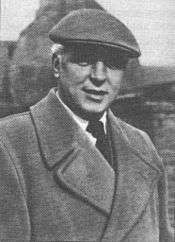Raich Carter
 | |||
| Personal information | |||
|---|---|---|---|
| Full name | Horatio Stratton Carter | ||
| Date of birth | 21 December 1913 | ||
| Place of birth | Hendon, Sunderland, England | ||
| Date of death | 9 October 1994 (aged 80) | ||
| Place of death | Willerby, England | ||
| Playing position | Inside forward | ||
| Senior career* | |||
| Years | Team | Apps | (Gls) |
| 1931–1939 | Sunderland | 245 | (118) |
| 1945–1948 | Derby County | 63 | (34) |
| 1948–1952 | Hull City | 136 | (57) |
| 1953 | Cork Athletic | 9 | (3) |
| National team | |||
| 1934–1947 | England | 13 | (7) |
| Teams managed | |||
| 1948–1951 | Hull City | ||
| 1953 | Cork Athletic | ||
| 1953–1958 | Leeds United | ||
| 1960–1963 | Mansfield Town | ||
| 1963–1966 | Middlesbrough | ||
|
* Senior club appearances and goals counted for the domestic league only. | |||
| Personal information | |||||||||||||||||||||||||||
|---|---|---|---|---|---|---|---|---|---|---|---|---|---|---|---|---|---|---|---|---|---|---|---|---|---|---|---|
| Born | England | ||||||||||||||||||||||||||
| Batting style | Right-handed batsman | ||||||||||||||||||||||||||
| Bowling style | Left-arm slow orthodox bowler | ||||||||||||||||||||||||||
| Domestic team information | |||||||||||||||||||||||||||
| Years | Team | ||||||||||||||||||||||||||
| 1946 | Derbyshire | ||||||||||||||||||||||||||
| First-class debut | 12 June 1946 Derbyshire v Worcestershire | ||||||||||||||||||||||||||
| Last First-class | 19 June 1946 Derbyshire v Surrey | ||||||||||||||||||||||||||
| Career statistics | |||||||||||||||||||||||||||
| |||||||||||||||||||||||||||
| Source: , January 2012 | |||||||||||||||||||||||||||
Horatio Stratton "Raich" Carter (21 December 1913 – 9 October 1994)[1][2] was an English sportsman who played association football for Sunderland from 1931 to 1939, for Derby County from 1945 to 1948 and for Hull City from 1948 to 1952. He also played first class cricket for Derbyshire in 1946. Later he became a football manager.
Background
Carter was born at Hendon, Sunderland, the son of Robert Carter who played football for Port Vale, Fulham and Southampton.
Football career
Carter captained Sunderland to the Football League title in 1936, at that time the youngest man ever to have captained a First Division title-winning side. He followed that up with victory in the FA Cup final a year later, scoring the second Sunderland goal in a 3–1 win over Preston North End.
The Second World War left him bereft of many of his peak years, like many great players of his age. Afterwards he picked up another Cup winners medal with Derby in 1946, becoming the only player to win Cup winners medals both before and after the war.
Carter was also capped 13 times for England as an inside forward.
Amongst his many admirers was the great Stanley Matthews, who said about him "I felt [he] was the ideal partner for me... Carter was a supreme entertainer who dodged, dribbled, twisted and turned, sending bewildered left-halves madly along false trails. Inside the penalty box with the ball at his feet and two or three defenders snapping at his ankles, he'd find the space to get a shot in at goal... Bewilderingly clever, constructive, lethal in front of goal, yet unselfish. Time and again he'd play the ball out wide to me and with such service I was in my element."[3]
Cricket career
While at Derby, Carter also played cricket for Derbyshire. He made his debut in June 1946 against Worcestershire. He was a right handed batsman and played 4 innings in three first class matches gaining an average of 2 and a top score of 7. He was a left-arm slow orthodox bowler and took 2 wickets at an average of 23.00 and a best performance of 2 for 39. He also played for Durham in the Minor Counties Championship.[4]
Managerial career
Carter continued his playing career at Hull City,[5] where he also managed the side, winning the Division Three North title and buying a young Don Revie. He briefly retired before returning with Hull, then moving to the Republic of Ireland to manage Cork Athletic. From there, he went on to manage Leeds United in 1953, where he built his team around the brilliant John Charles, and took Leeds to promotion in 1956 after a period of nine years in the Second Division. To many people's surprise, his contract was not renewed by the Leeds board in 1958 and he left the club.
In 1960 he became manager of Mansfield Town, and after achieving promotion from the Fourth Division was appointed to manage Middlesbrough, where he stayed from 1963 to 1966.
Death
In September 1994, 80-year-old Carter suffered a stroke. He died in hospital at Willerby in the following month.
Legacy
There is a road in Hull, that forms part of the A1033 road, named after him. Also named in his honour is The Raich Carter Sports Centre in the Hendon area of Sunderland, opened in 2001 near to where he grew up and loosely on the site of his hometown club's first ever ground.
The opening game at the new KC Stadium between Hull City and Sunderland in December 2002 was played for the Raich Carter Trophy. The Tigers beat the Black Cats 1–0.
References
- ↑ Dykes, Garth & Lamming, Doug (2000). All The Lads: A Complete Who's Who of Sunderand AFC. Sunderland AFC. p. 69. ISBN 1-899538-15-1.
- ↑ Betts, Graham (2006). England: Player by player. Green Umbrella Publishing. p. 61. ISBN 1-905009-63-1.
- ↑ http://www.spartacus.schoolnet.co.uk/SUNDERcarter.htm
- ↑ Raich Carter at Cricket Archive
- ↑ "Hull City Heroes – Raich Carter". Amber Nectar. 1 March 2010. Retrieved 1 March 2010.
External links
- Raich Carter management career statistics at Soccerbase
- Full Managerial Stats for Leeds United from WAFLL
- Remembering Raich: The Story of the Silver Fox
| Awards | ||
|---|---|---|
| Preceded by Ted Drake |
First Division top scorer 1935–36 |
Succeeded by Freddie Steele |